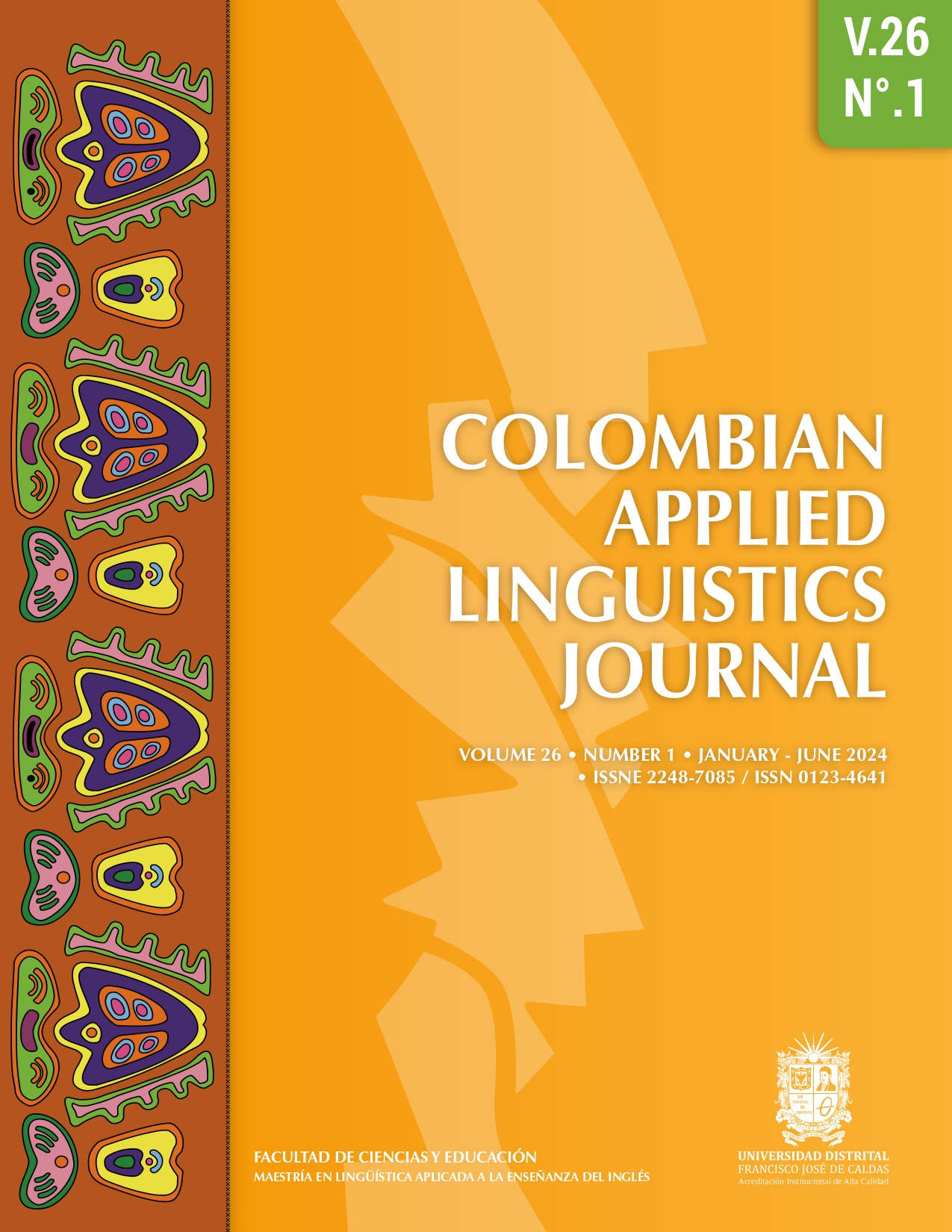DOI:
https://doi.org/10.14483/22487085.20469Publicado:
2024-05-24Número:
Vol. 26 Núm. 1 (2024): January-JuneSección:
Artículos de InvestigaciónVolver la atención a los exámenes de lengua, una paradoja en las universidades colombianas
Turning One’s Attention to Language Tests, a Paradox in Colombian Universities
Palabras clave:
Exámenes de lengua, Fenomenología, Moral, Política Lingüística (es).Palabras clave:
Language Policy, Language tests, Morality, Phenomenology (en).Descargas
Resumen (es)
Desde el 2020, en Colombia es requerido que los estudiantes de licenciaturas en lenguas (modernas o extranjeras) obtengan un nivel de suficiencia (C1) que confiere la validez del conocimiento de la lengua y la cultura como requisito de grado (MEN, 2017). La política lingüística postula que los exámenes de lengua miden las habilidades lingüísticas, así como las nociones y actitudes (inter)culturales de los estudiantes. Sin embargo, desde un lente sociocognitivo, la concepción de los exámenes no dice mucho sobre los procesos cognitivos y sociales que se tornan cruciales para la concepción misma de las pruebas. Por lo tanto, parece relevante revisar la ontología de los exámenes institucionales de lengua y poder identificar qué aspecto da coherencia y validez a la necesidad de obtener dichos exámenes como requisito de grado. Para lograr esto, se propone una descripción fenomenológica, postulando la siguiente hipótesis: los exámenes de lengua en lugar de medir las habilidades lingüísticas e (inter)culturales de los estudiantes, circundan, sobre todo, sus sistemas sociales y cognitivos, en especial, la moral. Como resultado, se podría postular que la concepción de los exámenes como requisito de grado requiere de cambios profundos a corto plazo.
Resumen (en)
Since 2020, in Colombia it is required that students of bachelor's degrees in foreign languages obtain a level of sufficiency (C1) that confers the validity of the knowledge of the language and culture as a degree requirement (MEN, 2017). Language policy posits that language tests measure students’ language skills as well as (inter)cultural notions and attitudes. However, from a socio-cognitive lens, the conception of the tests does not say much about the cognitive and social processes that become crucial for taking the exams. Therefore, it seems relevant to review the ontology of institutional language exams and to identify what aspect gives coherence and validity to the obtention of such tests as a degree requirement. To achieve this, a phenomenological description is proposed. The hypothesis of the manuscript says as follows: language tests, instead of measuring the linguistic and (inter)cultural skills of students, surround above all, their social and cognitive systems, especially morality. As a result, it could be postulated that the conception of standardized tests as a degree requirement requires profound and rapid changes.
Referencias
Berwick, R. (1997). Syntax Facit Saltum Redux: Biolinguistics and the Leap to Syntax. Neurolinguistics, Vol. 10, No. 213, (pp. 231-249).
Byram, M. (1991). “Teaching culture and language: Towards and integrated model”. En E. Hinkel (1999). Culture in Second Language Teaching and Learning. Cambridge: Cambridge University Press.
Byram, M, Zarate G. (1997). La compétence socioculturelle dans l’apprentissage et l’enseignement des langues. Conseil de L’Europe.
Calvet, L-J. (1987). La guerre des langues et les politiques linguistiques, Paris, Payot, nouvelle édition, 1999: Paris, Hachette.
Consejo de Europa (2001). Marco Común Europeo de Referencia para las Lenguas: aprendizaje, enseñanza, evaluación. (http://cvc.cervantes.es/obref/marco). Madrid: Instituto
Croft, W. (2009). Toward a social cognitive linguistics. In V. Evans, and S. Pourcel (eds) New Directions in Cognitive Linguistics. John Benjamins B.V (pp. 395-420).
Crystal, D. (2003). English as a Global Language. Cambridge University Press: London.
Damasio, A. Tranel, D. y Damasio, H. (1991). “Somatic markers and the guidance of behaviour: theory and preliminary testing”. En S. Harvey, M. Eisenberg, A. Benton (eds.), Frontal Lobe Function and Dysfunction, (pp. 217-229). Oxford University Press.
De Saussure, F. (1971). Cours de linguistique générale. Paris.
Evans, V. (2006). “Lexical Concepts, Cognitive models and Meaning-Construction”. Cognitive linguistics 17 (4), 491-534.
Fauconnier, G. & Turner, M. (2002). The Way We Think: Conceptual Blending and the Mind’s Hidden Complexities. New York, NY: Basic Books.
Fazekas, P. & Overgaard, M. A. Multidimensional Models of Degrees and Levels of Consciousness. Trends in Cognitive Sciences, Vol. 20, No. 10. doi.org/10.1016/j.tics.2016.06.011
Fuster, J. M. (2000). Executive frontal functions. Experimental Brain Research, 133, 66–70. DOI: 10.1007/s002210000401
Garavito, M. (2022). Hacerse el mundo con los otros. Bogotá: Centro Editorial Facultad de Ciencias Humanas. Universidad Nacional de Colombia.
Grosjean, F. (2015) “Bicultural Bilinguals”. International Journal of Bilingualism, Vol. 19(5) 572 –586. Universidad de Neuchâtel, Suiza. DOI: 10.1177/1367006914526297
Guadarrama, P. (2018). Para qué sirve la epistemología a un investigador y a un profesor. Cooperativa Editorial Magisterio.
Heidegger, M. (1971). Poetry, Language, Thought. New York: Harper & Row.
Heidegger, M. (2000). Los problemas fundamentales de la fenomenología. Editorial Trotta, Madrid.
Herrera, Daniel. (2001). La persona y el mundo de su experiencia. Bogotá, Universidad de San Buenaventura.
Husserl, E. (1982). La idea de la fenomenología. Cinco Lecciones, trad. de Manuel GARCÍA-BARÓ, Fondo de Cultura Económica, México; Madrid; Buenos Aires.
Hyland, K. (2005). Metadiscourse. London: Continuum.
Lakoff, G. & Johnson, M. (1999). Philosophy in the Flesh. Basic Books.
Liddicoat, A. y Scarino, A. (2013). Intercultural Language Teaching and Learning. Oxford. Wiley-Blackwell.
MEN (2017). Resolución 18583 de 2017 Ministerio de Educación Nacional. Disponible en https://www.icbf.gov.co/cargues/avance/docs/resolucion_mineducacion_18583_2017.htm
Merleau-Ponty, M. (1993). Fenomenología de la percepción. Barcelona: Planeta-Agostini.
Nolke, H., Flottum, K. y Norén, C. (2004). Scapoline. Théorie scandinave de la poliphonie linguistique. Editions Kimé.
Sartre, J-P. (1972). El ser y la nada. Bs. As., Ed. Losada.
Schutz, A. (2009). Las estructuras del mundo de la vida. Bs. As., Amorrortu.
Vargas Guillén, G. (2012). Fenomenología, formación y mundo de la vida. Saarbrücken, EAE.
Cómo citar
APA
ACM
ACS
ABNT
Chicago
Harvard
IEEE
MLA
Turabian
Vancouver
Descargar cita
Métricas
Licencia
Derechos de autor 2024 Jonathan Restrepo Rodas

Esta obra está bajo una licencia internacional Creative Commons Atribución-NoComercial-SinDerivadas 4.0.
Esta publicación tiene licencia de Creative Commons Reconocimiento-No comercial- Sin obras derivadas 2.5 Colombia. El lector podrá leer, copiar y distribuir los contenidos de esta publicación bajo los términos legales de Creative Commons, Colombia.
Para mayor información referirse a http://creativecommons.org/licenses/by-nc-nd/2.5/co/








